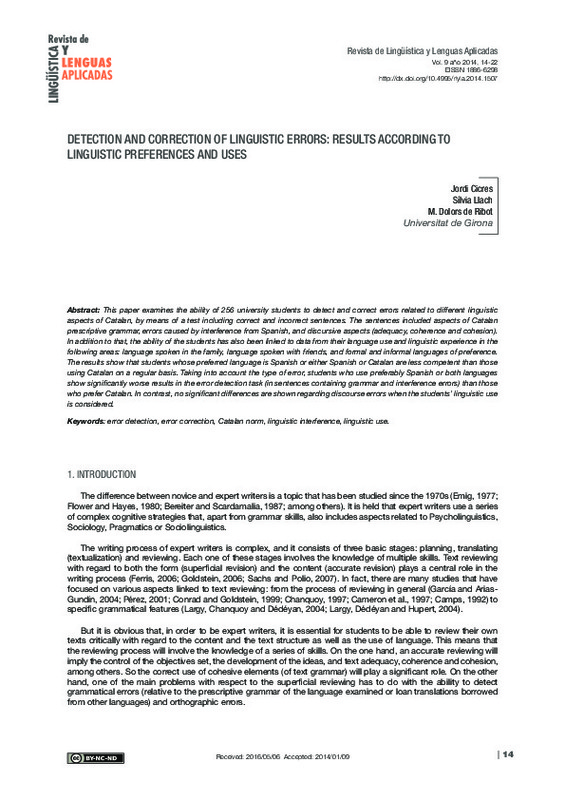JavaScript is disabled for your browser. Some features of this site may not work without it.
Buscar en RiuNet
Listar
Mi cuenta
Estadísticas
Ayuda RiuNet
Admin. UPV
Detection and correction of linguistic errors: results according to linguistic preferences and uses
Mostrar el registro sencillo del ítem
Ficheros en el ítem
| dc.contributor.author | Cicres Bosch, Jordi
|
es_ES |
| dc.contributor.author | Llach, Silvia
|
es_ES |
| dc.contributor.author | de-Ribot, María Dolors
|
es_ES |
| dc.date.accessioned | 2014-11-26T09:07:59Z | |
| dc.date.available | 2014-11-26T09:07:59Z | |
| dc.date.issued | 2014-07-01 | |
| dc.identifier.issn | 1886-2438 | |
| dc.identifier.uri | http://hdl.handle.net/10251/44857 | |
| dc.description.abstract | [EN] This paper examines the ability of 256 university students to detect and correct errors related to different linguistic aspects of Catalan, by means of a test including correct and incorrect sentences. The sentences included aspects of Catalan prescriptive grammar, errors caused by interference from Spanish, and discursive aspects (adequacy, coherence and cohesion). In addition to that, the ability of the students has also been linked to data from their language use and linguistic experience in the following areas: language spoken in the family, language spoken with friends, and formal and informal languages of preference. The results show that students whose preferred language is Spanish or either Spanish or Catalan are less competent than those using Catalan on a regular basis. Taking into account the type of error, students who use preferably Spanish or both languages show significantly worse results in the error detection task (in sentences containing grammar and interference errors) than those who prefer Catalan. In contrast, no significant differences are shown regarding discourse errors when the students' linguistic use is considered. | es_ES |
| dc.language | Inglés | es_ES |
| dc.publisher | Editorial Universitat Politècnica de València | |
| dc.relation.ispartof | Revista de Lingüística y Lenguas Aplicadas | |
| dc.rights | Reserva de todos los derechos | es_ES |
| dc.subject | Error detection | es_ES |
| dc.subject | Error correction | es_ES |
| dc.subject | Catalan norm | es_ES |
| dc.subject | Linguistic interference | es_ES |
| dc.subject | Linguistic use | es_ES |
| dc.title | Detection and correction of linguistic errors: results according to linguistic preferences and uses | es_ES |
| dc.type | Artículo | es_ES |
| dc.date.updated | 2014-11-26T08:32:57Z | |
| dc.identifier.doi | 10.4995/rlyla.2014.1507 | |
| dc.rights.accessRights | Abierto | es_ES |
| dc.description.bibliographicCitation | Cicres Bosch, J.; Llach, S.; De-Ribot, MD. (2014). Detection and correction of linguistic errors: results according to linguistic preferences and uses. Revista de Lingüística y Lenguas Aplicadas. 9:14-22. https://doi.org/10.4995/rlyla.2014.1507 | es_ES |
| dc.description.accrualMethod | SWORD | es_ES |
| dc.relation.publisherversion | https://doi.org/10.4995/rlyla.2014.1507 | es_ES |
| dc.description.upvformatpinicio | 14 | es_ES |
| dc.description.upvformatpfin | 22 | es_ES |
| dc.type.version | info:eu-repo/semantics/publishedVersion | es_ES |
| dc.description.volume | 9 | |
| dc.identifier.eissn | 1886-6298 | |
| dc.description.references | Amadeo, I. and Solé, J. (1996). Curs pràctic de redacció. Barcelona: Ed. Columna. | es_ES |
| dc.description.references | Arnau, J. (2004). "Sobre les competències en català i castellà dels escolars de Catalunya: una resposta a la polèmica sobre el decret d'hores de castellà", Llengua, Societat i Comunicació 1, 1-7. | es_ES |
| dc.description.references | Bereiter, C. and Scardamalia, M. (1987). The psychology of written composition. Hillsdale (N.J.): Erlbaum. | es_ES |
| dc.description.references | Chanquoy, L. (1997). "Thinking skills and composing: Examples of text revision", in J. H. M. Hamers and M. Overtoom (ed.) Inventory of European Programmes for teaching thinking, Utrecht: Sardes, 179-185. | es_ES |
| dc.description.references | Ellis, R. (1994). The study of second language acquisition. Oxford: Oxford Applied Linguistics. | es_ES |
| dc.description.references | Ellis, R. and Barkhuizen, G. (2005). Analysing Learner Language. Oxford: Oxford University Press. | es_ES |
| dc.description.references | Flower, L. and Hayes, J. R. (1980). "The dynamics of composing: Making plans and juggling constraints", in L. W. Gregg and E. R. Steinberg (ed.), Cognitive processes in writing, Hillsdale: N.J. Erlbaum, 31-50. | es_ES |
| dc.description.references | García, J. N. and O. Arias-Gundín (2004). "Intervención en estrategias de revisión del mensaje escrito", Psicothema 16 (2), 194-202. | es_ES |
| dc.description.references | MEC (2010). PISA 2009. Programa para la evaluación internacional de los alumnos. OCDE. Informe espa-ol. Madrid: Instituto de Evaluación. Ministerio de Educación. | es_ES |
| dc.description.references | MEC (2007). PISA 2006. Programa para la evaluación internacional de los alumnos. OCDE. Informe espa-ol. Madrid: Instituto de Evaluación. Ministerio de Educación. | es_ES |
| dc.description.references | Mestres, J. M., Costa, J., Oliva, M. and Fité, R. (2007). Manual d'estil. La redacció i l'edició de textos. 3rd edition. Vic: Eumo. | es_ES |
| dc.description.references | Pérez, S. A. (2001). "Revising During Writing in a Second Grade Classroom", Educational Research Quarterly 25 (1), 27-32. | es_ES |
| dc.description.references | Van der Pool, E. (1996). "A text-analytical study of conceptual writing processes and their development", in G. Rijlaarsdam, H. van der Bergh and M. Couzijn (ed.) Theories, Models and Methodology in Writing Research, Amsterdam: Amsterdam University Press, 456-472. | es_ES |








